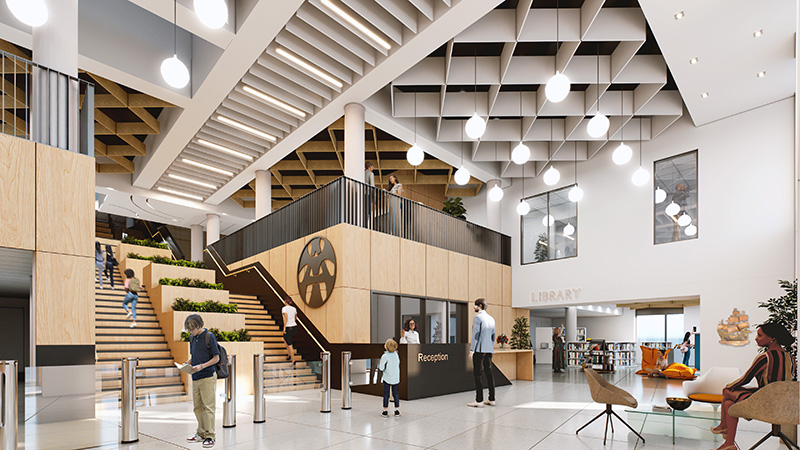
THE City of Edinburgh Council has granted planning permission for a new Passivhaus extension at Trinity Academy. Listed building consent has also been obtained for refurbishment and environmental improvement works to Trinity’s original Victorian school building that dates back to 1894 and is set within the Victoria Park conservation area.
The project was designed by Holmes Miller, architects of a new-build sports and outdoor centre for Trinity Academy which opened in 2022.
During the consultation process, staff, pupils and the local community are reported to have indicated a ‘strong desire’ to retain the original Victorian building, refurbish it and incorporate it into the new design.
The extension will feature a social and dining ‘heart’ where the school can come together to socialise, collaborate and learn. The original building will connect directly to this central space, bringing old and new together, while a ‘learning stair’ will also lead to the school’s main reception space.

Enabling works – including the installation of a temporary classroom and dining units that will allow the school to remain open during the build process – are expected to begin over the coming months.
Once a main contractor is appointed, several existing school buildings which are no longer fit for purpose will be demolished to make way for the new four-storey Passivhaus extension. This will offer modern learning facilities for the school’s 1,200 pupils, while also driving down running costs and carbon emissions.
Outdoor features will include an ‘arrival plaza’ with seating and social spaces, an amphitheatre, a wellbeing hub garden, a growing space and an outdoor gym. Cycle storage and electric vehicle charging also form part of the plans.
John Burns, associate at Holmes Miller, said, “Gaining planning permission for this modern, energy-efficient facility is great news for the community both in and around Trinity Academy. The project not only considers environmental design requirements but also relates to the sensitive historic context and original school building.
“The team here are looking forward to delivering a project that meets all the aspirations of the Scottish Government Learning Estate Investment Strategy – to connect people, places and learning, improve outcomes for all and promote sustainable and inclusive economic growth. The project will involve several phases and elements to keep the school live and functioning during the build and refurbishment process, and we have a clear decant and phasing strategy in place to minimise disruption to pupils and staff.”
The wider design team includes Atkins Realis, Rybka, Etive, Wardell Armstrong, and Architype.








